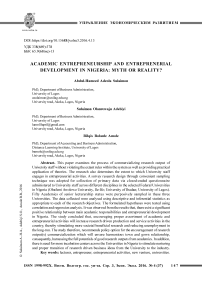Academic entrepreneurship and entreprenerial development in Nigeria: myth or reality?
Автор: Sulaimon Abdul-Hameed Adeola, Adebiyi Sulaimon Olanrewaju, Amole Bilqis Bolanle
Журнал: Вестник Волгоградского государственного университета. Экономика @ges-jvolsu
Рубрика: Управление экономическим развитием
Статья в выпуске: 4 (37), 2016 года.
Бесплатный доступ
This paper examines the process of commercializing research output of University staff without violating the extant rules within the system as well as providing practical application of theories. The research also determines the extent to which University staff engages in entrepreneurial activities. A survey research design through convenient sampling technique was adopted for collection of primary data via closed-ended questionnaire administered to University staff across different disciplines in the selected Federal Universities in Nigeria (Obafemi Awolowo University, Ile-Ife; University of Ibadan; University of Lagos). Fifty Academics of senior lecturership status were purposively sampled in these three Universities. The data collected were analysed using descriptive and inferential statistics as appropriate to each of the research objectives. The formulated hypotheses were tested using correlation and regression analysis. It was observed from the results that, there exist a significant positive relationship between main academic responsibilities and entrepreneurial development in Nigeria. The study concluded that, encouraging proper assortment of academic and entrepreneurial activities will increase research driven production and service activities in the country, thereby stimulating more societal beneficial research and reducing unemployment in the long-run. The study therefore, recommends policy option for the encouragement of research output(s) commercialization which will ensure harmonious town and gown relationship, consequently, harnessing the full potentials of good research outputs from academics. In addition, there is need for more incubation centers across the Universities in Nigeria to stimulate nurturing and proper transition of research driven business ideas from the University to the industry.
Lecturer, entrepreneur, entrepreneurial activities, new venture, universities
Короткий адрес: https://sciup.org/14971192
IDR: 14971192 | DOI: 10.15688/jvolsu3.2016.4.13
Список литературы Academic entrepreneurship and entreprenerial development in Nigeria: myth or reality?
- Barth T., Schlegelmilch W. Academic Entrepreneur, Academic Entrepreneurship. Carayannis E., ed., Encyclopedia of Creativity, Invention, Innovation and Entrepreneurship. New York, Springer, 2013, pp. 1-8.
- Bubela T. M., Caulfield T. Role and reality: technology transfer at Canadian universities. Trends in Biotechnology, 2010, no. 28 (9), pp. 447-451.
- Cantaragiu R. Towards a conceptual delimitation of academic entrepreneurship. Management & Marketing, 2012, no. 7 (4), pp. 683-700.
- Cho B. Study of the effective entrepreneurship education method and its process. Business Education Research, 1998, no. 2 (1), pp. 27-47.
- Clarysse B., Wright M., Lockett A., Van de Velde E., Vohora A. Spinning out new ventures: a typology of incubation strategies from European research institutions. Journal of Business Venturing, 2005, no. 20, pp. 183-216.
- Debackere K., Veugelers R. The role of academic technology transfer organizations in improving industry science links. Research Policy, 2005, no. 34 (3), pp. 321-342.
- Lee Y.S. The sustainability of university -industry research collaboration: an empirical assessment. The Journal of Technology Transfer, 2000, no. 25, pp. 111-133.
- Markman G.D., Gianiodis P.T., Phan P.H., Balkin D.B. Innovation speed: Transferring university technology to market. Research Policy, 2005, no. 34 (7), pp. 1058-1075.
- Markman G., Siegel D., Wright M. Research and technology commercialization. Journal of Management Studies, 2008, no. 45, pp. 1401-1423.
- Meyer M. Academic entrepreneurs or entrepreneurial academics? Research-based ventures and public support mechanisms. Research and Development Management, 2003, no. 33(2), pp. 107-115.
- Nazaryeva K. Academic entrepreneurship in the context of a technology transfer office. A case from Brazil. Master of Philosophy in Higher Education thesis, Department of Education, Faculty of Educational Sciences. Universitet Oslo, 2015.
- Pallant J. SPSS survival manual. London, Open University Press, McGraw-Hill, 2010.
- Penrose E.T. The theory of the growth of the firm. New York, John Wiley, 1959.
- Phan P.H., Siegel D.S., Wright M. Science parks and incubators: observations, synthesis and future research. Journal of Business Venturing, 2005, no. 20 (2), pp. 165-182.
- Siegel D.S., Wright M. Academic entrepreneurship: Time for a rethink? ERC Research Paper, 2015, no. 32, pp. 1-39.
- Siegel D.S., Waldman D., Link A. Assessing the impact of organizational practices on the relative productivity of university technology transfer offices: an exploratory study. Research Policy, 2003, no. 32, pp. 27-48.
- Thursby J.G.A., Jensen R.A., Thursby M.C.A. Objectives, characteristics and outcomes of university licensing: a survey of major US universities. Journal of Technology Transfer, 2001, no. 26, pp. 59-72.
- Wood M.S. A process model of academic entrepreneurship. Business Horizons, 2011, no. 54 (2), pp. 153-161.


